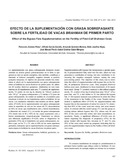| dc.rights.license | http://creativecommons.org/licenses/by-nc-sa/3.0/ve/ | |
| dc.contributor.author | Jiménez P., Florencio A. | |
| dc.contributor.author | García Gavidia, Alfredo N. | |
| dc.contributor.author | Quintero Moreno, Armando | |
| dc.contributor.author | Rojas, Nidia | |
| dc.contributor.author | Finol, José Manuel | |
| dc.contributor.author | Galué Márquez, Isabel Cristina | |
| dc.date.accessioned | 2012-09-28T21:21:09Z | |
| dc.date.available | 2012-09-28T21:21:09Z | |
| dc.date.issued | 2012-09-28T21:21:09Z | |
| dc.identifier.issn | 0798-2259 | |
| dc.identifier.uri | http://www.saber.ula.ve/handle/123456789/35966 | |
| dc.description.abstract | La suplementación con grasa sobrepasante incorpora mayor
cantidad de ácidos grasos poli-insaturados en la dieta lo que
genera no sólo un aporte energético, sino también, contribuye a
disminuir el balance energético negativo durante el período
postparto temprano. El objetivo del presente estudio fue determinar
el efecto de la suplementación con grasa sobrepasante
sobre la fertilidad en vacas Brahman de primer parto. Se utilizaron
60 novillas Brahman gestantes, distribuidas en tres tratamientos
de 20 repeticiones cada uno. T1 (control) sin suplementación,
T2 ración de dos kg de afrecho de Triticum aestivum
más 150 gd-1 de grasa sobrepasante y T3 similar a T2 pero sin
grasa sobrepasante. Se realizó un análisis de Ji-cuadrado para
relacionar el efecto de los tratamientos sobre la fertilidad de las
vacas. Los resultados obtenidos demostraron un efecto significativo
(P<0,05) de la suplementación con grasa sobrepasante
sobre la expresión de celo en las vacas del T2, observándose
un 95% de vacas que manifestaron celo y fueron inseminadas;
a diferencia del control (T1) y la ración sin grasa sobrepasante
(T3) donde solo el 60 y 65% de las vacas expresaron celo y
fueron inseminadas, respectivamente. Finalmente se obtuvo
una diferencia significativa (P<0,05) sobre el diagnóstico de
gestación (70%) en el tratamiento con grasa sobrepasante, debido
a que, en los T1 y T3, sólo el 25% de las vacas quedaron
gestantes, indicando que la suplementación con grasa sobrepasante
mejora la fertilidad de vacas Brahman de primer parto. | es_VE |
| dc.language.iso | es | es_VE |
| dc.rights | info:eu-repo/semantics/openAccess | |
| dc.title | Efecto de la suplementación con grasa sobrepasante sobre la fertilidad de vacas brahman de primer parto | es_VE |
| dc.title.alternative | Effect of the bypass fats supplementation on the fertility of first-calf brahman cows | es_VE |
| dc.type | info:eu-repo/semantics/article | |
| dc.description.abstract1 | Supplementation with bypass fats incorporates a greater quantity
of polyunsaturated fatty acids into the diet, which not only
generates a contribution of energy, but also contributes to decreasing
the negative energetic balance during the early
post-calving period. The objective of this study was to determine
the effect of supplementation with bypass fats on the fertility
of primiparous Brahman cows. Sixty pregnant Brahman
heifers were used, distributed in three treatments of 20 repetitions
each. Group T1 (control) received a diet without supplements,
T2, a ration of two kg of wheat bran plus 150 gd-1 of bypass
fats, and T3, a diet similar to T2, but without the bypass
fats. A Chi-squared analysis was performed to relate the effect
of the treatments to the fertility of the cows. Results demonstrated
a significant effect (P<0.05) for supplementation with
bypass fats on the expression of estrus for cows in T2, observing
that 95% of the cows went into estrus and were inseminated,
in contrast with the control group (T1) and the group receiving
rations without bypass fats (T3), where only 60 and
65% of the cows went into estrus and were inseminated, respectively.
Finally, a significant difference (P<0.05) was obtained
regarding the diagnosis of pregnancy (70%) for the
group treated with bypass fats, because in T1 and T3, only
25% of the cows were ended up pregnant, indicating that bypass
fat supplementation improves the fertility of first-calf Brahman
cows. | es_VE |
| dc.description.colacion | 437-442 | es_VE |
| dc.description.email | florencio.jimenez@fcv.luz.edu.ve | es_VE |
| dc.description.frecuencia | Bimestral | |
| dc.identifier.depositolegal | 199102ZU46 | |
| dc.subject.institucion | Universidad del Zulia (LUZ) | es_VE |
| dc.subject.institucion | Universidad de Los Andes (ULA) | es_VE |
| dc.subject.publicacionelectronica | Revista Científica | |
| dc.subject.seccion | Revista Científica: Producción Animal | es_VE |
| dc.subject.thematiccategory | Medio Ambiente | es_VE |
| dc.subject.tipo | Revistas | es_VE |
| dc.type.media | Texto | es_VE |


